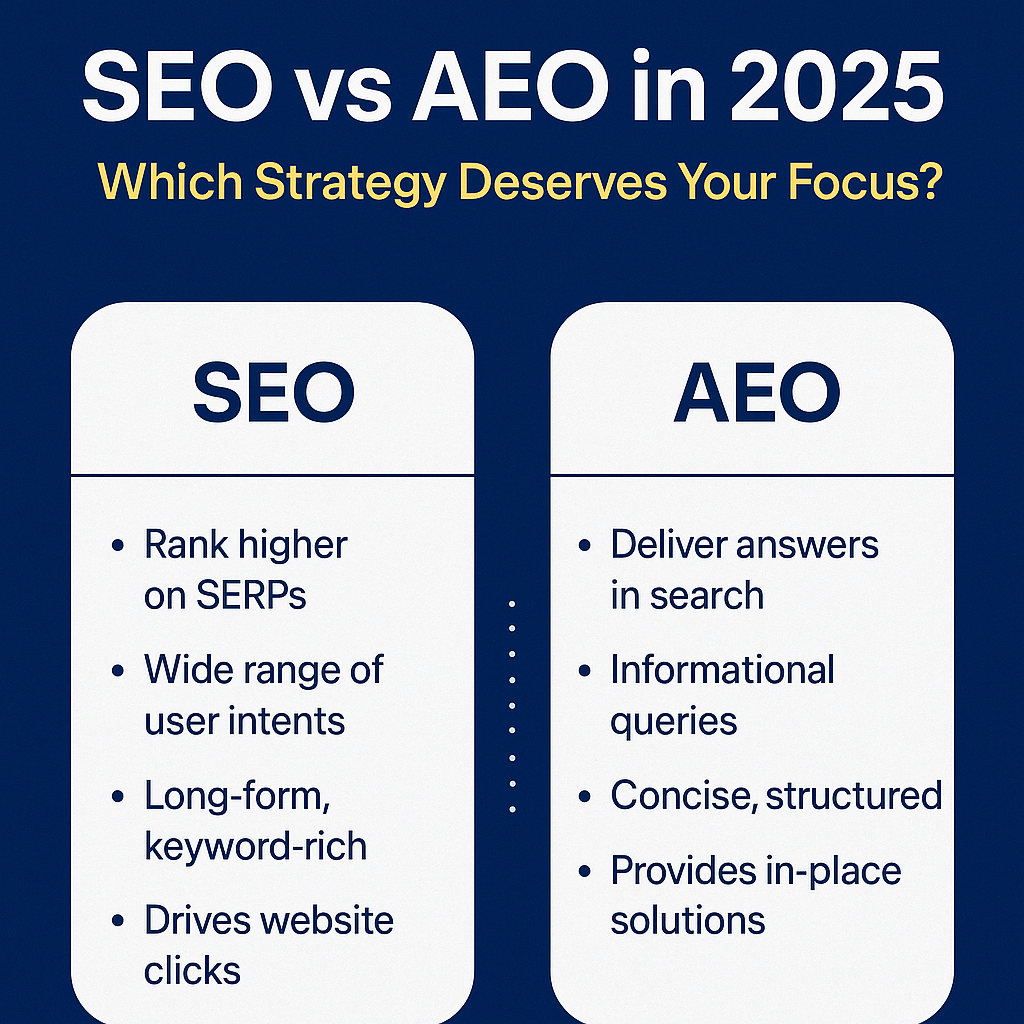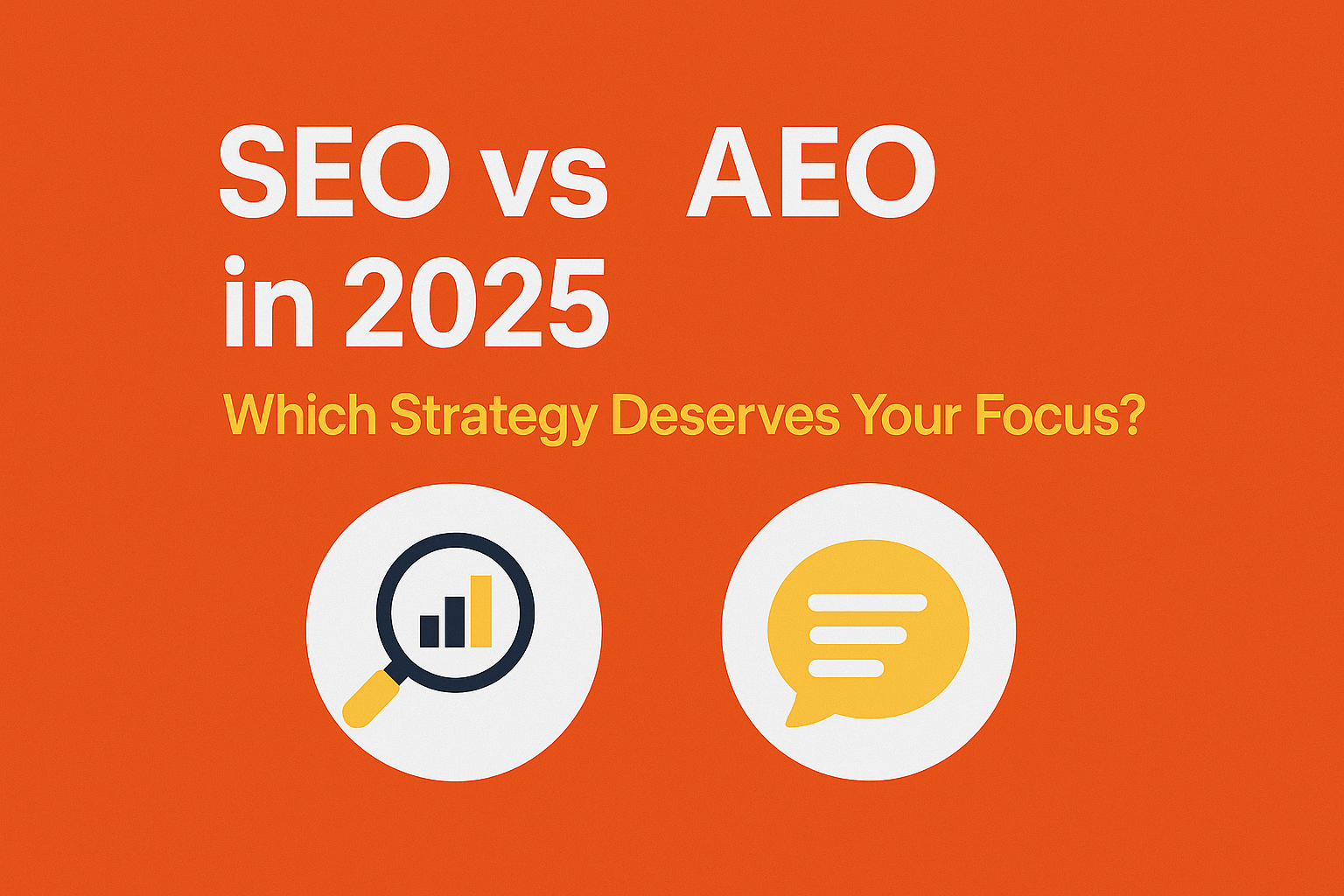In this fast-moving digital world, ranking on Google is essential to grow your business fast. But as a digital marketer, do you think it is enough to just show up on Google?
Today's internet users don't have the time to scroll for research; they're looking for instant answers. The way people search and expect answers has now completely changed. Search Engine Optimisation (SEO) has been the go-to strategy for visibility on Google for years. However, the trend has changed with the Answer Engine Optimisation (AEO). It is changing the rules by prioritising the answers over rankings.
So, if you're optimising only for SEO, you might be missing out on future trends. In the fast-changing world of digital marketing, staying ahead means understanding the trends in how users search and how search engines respond.
Let's discover the key differences between SEO and AEO and why you must master both to stay relevant in 2025.
What is AEO?
Answer Engine Option (AEO) is a digital marketing strategy. It optimises content to appear directly as answers in search engine results. AEO is mainly used in AI-powered answer engines like Google's featured snippets, Siri, Alexa, or ChatGPT. These tools give users direct answers instead of listing sponsored websites or blogs.
Traditional SEO strategies focus on high rankings on search result pages. AEO focuses on providing concise, accurate, and user-friendly answers to specific questions. It is all about making your content the answer that appears on the web and is directly delivered to users.
SEO vs. AEO
- Purpose
- SEO helps to rank web pages higher on search engine result pages.
- AEO helps to make the content suitable for direct answers using AI tools and voice assistants.
- User Intent
- SEO targets a mix of informational, navigational, and transactional queries.
- AOE mainly focuses on information and question-based queries.
- Content Format
- SEO emphasises long-form and detailed content that is optimised with specific keywords.
- AEO prioritises concise, structured answers that are easy for machines to interpret.
- Search Experience
- SEO encourages users to click through to websites.
- AEO focuses on delivering the answer directly within the search interface.
- Optimisation Techniques
- SEO uses keyword optimisation, backlinks, page speed, and mobile-friendliness.
- AEO uses structured data, schema markup, FAQs, and natural language.
- Tools Used
- SEO is done with the help of tools like Google Search Console, SEMrush, and Ahrefs.
- AEO often uses schema generators, NLP tools, and answer engine insights.
Why is AEO important?
The demand for AI-powered search and voice assistants has increased. Users now want a fast and precise answer to their query, often without clicking through to a website. It saves their time from further research.
Optimising your content for answer engines can:
- Increase brand visibility in zero-click searches
- Increase authority and trust
- Position your website as a go-to expert in your niche.
- Help in enhancing credibility
- Provide a competitive advantage
Can SEO & AEO Work Together?
Absolutely! The most effective content strategies combine SEO and AEO. By aligning your content with SEO and AEO, you can provide your target audience with what they are looking for and rank your website page.
And here's how you can use both simultaneously–
- Use clear and concise language to answer common questions
- Structure your content properly with headings, bullet points, and schema markup
- Research keywords and user intent to create content that ranks well and answers fundamental questions
- Create FAQ sections on your pages to combine SEO and AEO strategies and results.
Conclusion

Answer Engine Optimisation (AEO) is your new digital marketing performance tool. It ensures that your content is ready to deliver precise and direct answers, no matter where your users search. The most innovative brands today are using a combination of AEO and SEO. SEO helps in ranking your content at the top of search results.
Today, in this digital world, where attention spans are very short and questions are constant, real marketers will stop focusing on clicks and start providing straightforward answers to the user.
So, the next time you create content, ask yourself: Is this searchable? And just as importantly, is this answerable?
